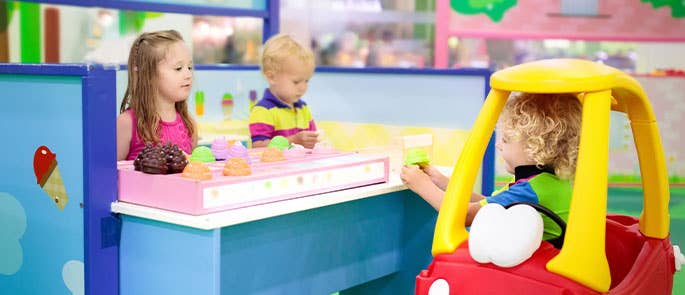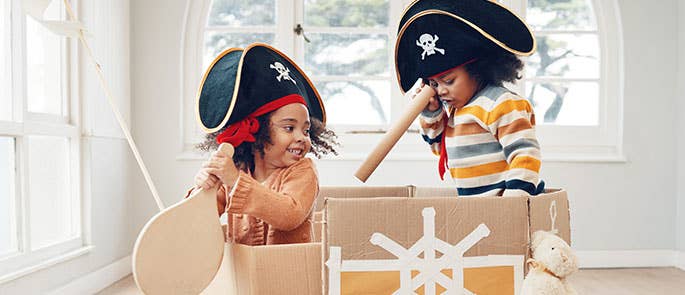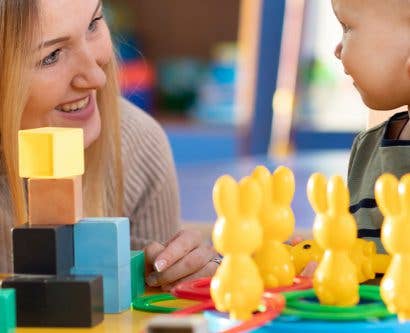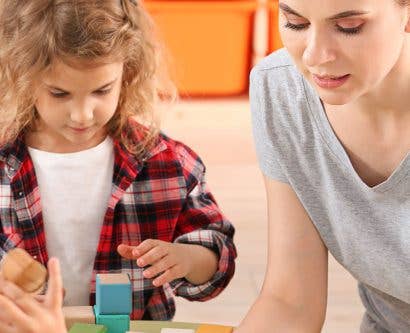Benefits of Role Play in Early Years: Advice for Teachers
Research has never been clearer – a child’s early education lasts a lifetime. In the first five years of their lives children are learning behaviourally, cognitively, physically, and socially at a faster rate than at any other time, and therefore a child’s future is profoundly shaped by their experiences in early years education. Two of the most vital aspects of early years education to help set a child up for future success is guiding development and improving communication, but what are the best strategies to do this successfully?
Whilst some may see playing and learning as two separate endeavours, this is not always the case in early years education. In fact, role play has proven to be an extremely successful way of promoting child development and advancing communication skills in young students.
In this article, we will define what role play in early years education is, explain its importance to a young child’s academic experience, specifically in aiding child development and communication, and give a selection of ideas for role play that you can incorporate into your early years classroom.
What is Role Play in Early Years?
Role play is an activity where children can act out different scenarios, take on certain roles, or mimic a range of characters, using their imagination and creativity to bring these fantasies to life. Children can use their bodies, voices, actions, and props in order to role play either on their own or as part of a group. There are many types of role play, but here are a few that tend to be most popular amongst children and are frequently used within early years education:
- Vocational Role Play – This form of role play involves students acting out certain professions, playing the character of someone working in a specific career, and mimicking scenarios you may encounter in that role. Popular examples of this variation of role play include playing doctors/nurses, vets, or firefighters.
- Domestic Role Play – Rather than imagining what may occur in a professional scenario, this form of role play usually involves children imitating behaviour they’ve witnessed at home or when with their families. This may include ‘playing parent’ by pretending to care for a doll or imagined child as if it were their own, or envisioning visiting or owning a shop and acting out scenarios that may occur in a commercial setting.
- Fantasy Role Play – Whereas the two previous forms of role play tend to mimic real-life scenarios, fantasy role play is more creative as it involves taking on a completely imagined guise, such as a superhero or a character from a fairy tale. Whereas vocational and domestic role play mostly follow imagined scenarios fixed in reality, fantasy role play can take any direction and thus its possibilities are limitless.

Importance of Role Play in Early Years
Many children are naturally inclined to engage in role play games but in addition to them being fun for young pupils, there are also many benefits to them and therefore it is a purposeful form of play. Role play allows children to explore their ideas about the world and learn about their peers in a safe and relaxed space. By externalising their own experiences into an imagined character and scenario, children can explore their anxieties, dreams, and preferences without the pressure that reality can often bring.
Whilst many of the benefits of early years role play centre around helping children to mature there are also more traditional academic advantages too. Many role play scenarios will include aspects of literacy or numeracy, whether it’s writing out a menu when imitating a café, or tallying up a customer receipt when ‘playing shop’; children will have plenty of opportunities to practise spelling, reading, counting, measuring, and arithmetic without even really noticing they’re learning!
Importance of Role Play in Child Development
In the last released key national statistics for foundation stage, which demonstrates children’s levels of early years development as captured at the end of their first year of school, it was revealed that 36.6% of children are currently not reaching the expected level of development. Thus, it’s clearly important to prioritise activities that are effective in improving this area, and role play has been shown to help aid each of the main areas of child development.
Find more about child development, including its four main areas, in our article Why is Child Development So Important in Early Years?
Social and Emotional Skills
Although role play can be solitary, it is often a group experience and thus can help form strong relationships and build children’s social and emotional skills. Whilst role play offers a fantastic way for children to discover shared interests, the nature of group role play means it will inevitably involve some sharing, collaboration, compromise, and teamwork, thus resulting in more socially mature students.
Furthermore, role play can help develop empathy and listening skills as it allows children to see the world from a range of other perspectives.
Cognitive and Intellectual Skills
Engaging in role playing can have a profound impact on children’s cognitive development. Often, role play scenarios will involve the need to anticipate consequences and find ways to overcome challenges. Thus, it provides an effective way for children to organically learn how to use critical thinking, problem solve, and make decisions.
Motor Skills
Role play provides opportunities for children to be active and therefore develop a range of both fine and gross motor skills.
Frequently, role play will involve a range of whole body movements, as children imitate the actions they’ve seen around them. Whether that’s imitating chores such as sweeping or ironing, or running, jumping, pulling and pushing, each of these activities will involve using a child’s large muscles in their torso, legs, and arms.
In addition, early years role play often involves the use of tools which help children practise control and hand-eye coordination, such as using scissors or pencils.

Importance of Role Play in Communication
One key area of development that is especially aided by regular role play in early years is a child’s ability to communicate effectively. The experience of participating in role play as a group involves a fair amount of planning and discussion of ideas. As such, children naturally grow confidence and skill in expressing themself and their needs.
As well as growing in confidence, role play is also extremely beneficial for improving the quality and depth of a child’s communicative abilities. While playing, children will practise language often used in everyday life when imitating scenarios they’ve witnessed out in reality. Additionally, they are likely to discuss their roles in all tenses (past, present and future) as well as connecting ideas or events together. This all contributes to them expanding their range of communication and honing its quality.
Furthermore, role play often involves experimenting with communication by, for example, imitating tone of voice, body language, and expression. As all children undertake this experimentation with language together, they are able to learn from each other and build upon their existing knowledge.
To learn more about aiding communication skills in children, read our article on Supporting Language Development in the Early Years.
Want to Learn More?
Build on your knowledge of developing communication skills in the young children with our comprehensive course on Supporting Speech and Language Development in the Early Years.
Role Play Early Years Ideas
As previously mentioned, there are a few different types of role play which are each highly beneficial to advancing child development, as well as encouraging children to have fun and socialise.
One of the best ways to incorporate role play into your early years routine is to provide relevant props to stimulate the imagination and act as a great starting point for creative play. For example, having a role play corner containing items such as a toy kitchen, shop counter and till, dolls, costumes, and vocational items like a stethoscope or hard hat, can be a fantastic way to naturally encourage role play in your classroom.

You can find a range of vocational, domestic, and fantasy role play ideas to implement in your early years classroom, below:
Fire Station Role Play
Imagining working as a firefighter offers a fun and active way for children to learn about emergency services and how to respond in a risky scenario. This role play example will involve a lot of gross motor skills, for example when pretending to climb ladders, slide down the pole, or carry buckets of water, and therefore is great for advancing physical development.
The scenarios imitated in this role play will also involve a lot of problem solving and critical thinking, as children discuss how to act to remedy whatever emergency they’re recreating.
Vet Surgery Role Play
Veterinary role play can teach children a lot about empathy, as the play will be focused around identifying ‘symptoms’ and caring for animals in a gentle way. Furthermore, children will learn about the responsibility of looking after another being, helping them to start considering other experiences beyond their own.
As with the previous example, vet role play will also encourage the use of cognitive thinking skills, as children assess problems and how to solve them.
Shopkeeper Role Play
The experience of pretending to own a shop and deliver customer service will help to develop all aspects of a child’s development, including their academic abilities. In particular, shopkeeping role play will involve a lot of money maths as children pretend to use a till, count out money to pay, or provide change helping to improve literacy skills in children. Furthermore, literacy skills may be exercised when writing shopping lists or product labels.
Additionally, this role play example is greatly effective at improving communication skills. Children will be imitating language that is highly transferable to real life, and practising these kinds of interactions in a safe space may help shyer individuals to gain confidence to speak in a more public setting.
Parent and Baby Role Play
Domestic role play is the most familiar experience children can have when playing, as it relates directly to their lives at home. Imitating family life through play, for example when caring for a baby (often in the form of a doll), is a great way for children to learn more about each other’s family lives and begin to understand various home dynamics and family experiences.
Fairy Tale Role Play
Acting out their favourite fairy tale is a fantastic way for children to express their imagination and cement the moral lessons that are often offered by these traditional tales. By acting out well-loved stories children learn from the mistakes of characters they’re playing, which helps them to develop critical thinking skills and good decision making. Thus, this form of role play can be a useful tool to promote good behaviour. You can find further tips for this in our full article on Promoting Positive Behaviour in Early Years: A Guide for Nurseries.
Fairy Tales also usually contain some form of adversity which children can learn from when connecting the story to real life via role play, helping them to build emotional resilience and confront their fears or anxieties.
From an academic point of view, role playing fairy tales is highly beneficial in improving vocabulary and demonstrating the structure of stories, as well as fostering a love of literature and reading.
As well as being a fun and social activity, encouraging role play in early years can have many benefits, particularly in improving all forms of child development and communication. Taking on different roles and playing characters across a wide range of real-life or imagined scenarios helps to develop social and emotional awareness, cognitive progression, motor skills, and language development in children. There are many different forms of role play to spark imagination, so it’s well worth trying to encourage this form of educational play in your early years classroom.
Further Resources:
- Why is Child Development So Important in Early Years?
- Curiosity Approach in Early Years: Importance and Ideas
- Promoting Positive Behaviour in Early Years: A Guide for Nurseries
- Supporting Language Development in the Early Years
- What is Active Learning?
- What is the Problem-Solving Method of Teaching?











